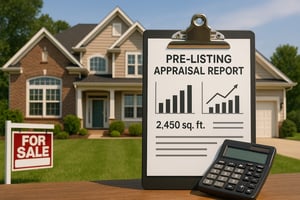
Knowledge Center

Why do you need an Appraisal?
Every year, countless people in the United States buy, sell or refinance their slice of the "American Dream" using mortgage financing. Most, if not all, of these mortgage transactions, require an opinion of value from a licensed real estate appraiser. It has become an understood and accepted part of a real estate transaction. "Let's bring in the expert and ensure we're not spending [lending] too much on this property."
But is this the only reason to get an appraisal done? Are there other times when the services of a licensed, unbiased real estate professional might come in handy?
Pre-Sale Decisions
Before someone decides to sell a home, several decisions must be made. First and foremost: ''How much should it sell for?'' But first, there may be other equally important questions to ask: ''Would it be better to paint the entire house first?'' ''Should I put in that third bathroom?'' ''Should I complete my kitchen remodel?'' Many things which we do to our houses have an effect on their value. Unfortunately, not all of them have an equal effect. While a kitchen remodel may improve the appeal of a home, it may not add nearly enough to the value to justify the expense.
Appraisers can step in and help make these decisions. Unlike a Realtor, an appraiser has no vested interest in what amount the house sells for. His fee is based on his efforts, not a percentage of the sales price. So seeking a professional appraisal can often help homeowners make the best decisions on investing in their homes and setting a fair sales price.
Property Tax Challenges
It's a running joke that everyone has a different perspective on what a house is worth. And it's the tax assessor that seems to always come in at the high end of the scale! Challenging the tax assessment has become an annual ritual in many parts of the country. Unfortunately, most people go into these challenges unarmed. They may pull some information from the internet to support their claims but have no real basis other than: ''It wasn't worth that much last year.''
A real estate appraiser can help in these situations. While it may not be economical to commission full appraisals to lop a few hundred off your tax bill, often, an appraiser can do a limited appraisal or neighborhood analysis for much less. These documents can carry a lot of weight when you appear before an appeals board.
PMI Removal
Private Mortgage Insurance, or PMI, is the supplemental insurance that many lenders ask home buyers to purchase when the amount being loaned is more than 80% of the home's value. This additional payment is often folded into the monthly mortgage payment and is quickly forgotten. This is unfortunate because PMI becomes unnecessary when the remaining balance of the loan - whether through market appreciation or principal paydown - dips below this 80% level. In fact, the United States Congress passed a law in 1998 (the Homeowners Protection Act of 1998) that requires lenders to remove the PMI payments when the loan-to-value ratio conditions have been met.
Many appraisers offer a specific service for homeowners that believe they have met the 80% loan-to-value metric. For a nominal fee, the appraiser can provide you with a statement regarding the home value. Some will even take the next step and help you file a challenge with your mortgage company. The costs of these services are very often recovered in just a few months of not paying the PMI.
Estate Planning, Liquidation, or Divorce
The loss of a loved one is a difficult time in life. Likewise, a divorce can be a particularly traumatic experience. Sadly, these events are often complicated by difficult decisions regarding the disposition of an estate. Unlike many wealthy individuals, most Americans do not have dedicated estate planners or executors to handle these issues. Also, in most cases, a home or other real property makes up a disproportionate share of the total estate value.
Here too, an appraiser can help. The first step in fairly disposing of an estate is often to understand its true value. Where property is involved, the appraiser can help determine the true value. At this point, equitable arrangements can more easily be arrived at among disputing parties. Everyone walks away knowing they've received a fair deal.
There are other uses for real estate appraisals. The highly-trained individuals behind these services are always looking for ways to put their expertise to work for homeowners and the people who support them.
Appraiser Ethics
Appraisal is a profession, and appraisers are professionals. In our field, as with any profession, we are bound by ethical considerations.
An appraiser's primary responsibility is to their client. Typically, in residential practice, the appraiser's client is the lender ordering the appraisal to decide whether to make the mortgage loan. Appraisers have specific duties of confidentiality to their clients -- as a homeowner, if you want a copy of an appraisal report, you usually have to request it through your lender -- obligations of numerical accuracy depending on the assignment parameters, an obligation to attain and maintain a certain level of competency and education, and must generally conduct him or herself as a professional. Here, we take these ethical responsibilities very seriously.
Appraisers may also have fiduciary obligations to third parties, such as homeowners, buyers, sellers, or others. Those third parties normally are spelled out in the appraisal assignment itself. An appraiser's fiduciary duty is limited to those third parties who the appraiser knows based on the scope of work or other written parameters of the assignment.
There are ethical rules that have nothing to do with clients and others. Appraisers must keep their work files for a minimum of five years.
We only perform to the highest ethical standards possible. We don't do assignments on contingency fees. That is, we don't agree to do an appraisal report and get paid only if the loan closes. We don't do assignments on percentage fees. That is the appraisal profession's biggest no-no because it tends to make appraisers inflate the value of homes or properties to increase their paycheck. We don't do that. Other unethical practices may be defined by state law or professional societies to which an appraiser belongs.
The Uniform Standards of Professional Appraisal Practice (USPAP) also defines as unethical the acceptance of an assignment that is contingent on "the reporting of a pre-determined result (e.g., opinion of value)," "a direction in assignment results that favors the cause of the client," "the amount of a value opinion," and other things. This means you can be assured that we are working to objectively determine the home or property value.
You can be assured of 100% ethical, unbiased, and professional service.

Appraisal Terminology
Have you heard an appraiser use any of these terms? Did you hear one of our appraisers use it, and you came here to figure out what it meant? We don't mean to speak a foreign language, but any profession has its specific lexicon. What "res ipsa loquitur" is to a lawyer, or "triple witching day" is to stock traders, "external obsolescence" is the same for appraisers. Here are some examples of common appraiser terminology and their meanings:
Adjustment
When comparable properties have been identified, the appraiser adjusts the value of the subject property according to differences in living area, acreage, frontage, amenities and the like. This is where the professional expertise of an appraiser is most valuable.ANSI
ANSI® Z765-2021 (American National Standards Institute®) measuring standard for measuring, calculating, and reporting above and below grade square footage(s) to determine gross living area (GLA) and non-GLA areas of subject properties for appraisals requiring interior and exterior inspections with effective dates of April 1, 2022 or later on loans sold to Fannie Mae.Bracketing
A process in which an appraiser determines a probable range of values for a property by applying comparative analysis techniques to data such as a group of sales. The array of comparable sales may be divided into three groups – those superior to the subject, those similar to the subject and those inferior to the subject. The sale price reflected by the sales requiring downward adjustments and those requiring upward adjustment refine the probable range of values for the subject and identify a value range (i.e., a bracket ) in which the final value opinion will fall.Cap Rate
The capitalization rate is calculated by dividing a property's net operating income by the current market value. This ratio, expressed as a percentage, is an estimation of an investor's potential return on a real estate investment.Chattel
Personal property that may be on the subject property but which does not figure into the opinion of value in the appraisal report.Comparable or "Comp"
Properties like the subject property nearby, which has sold recently, are used as a basis to determine the fair market value of the subject property. The Uniform Standards of Professional Appraisal Practice (USPAP) establish clear guidelines for comparable selection.Cost Approach
It is an appraisal method where the subject property's value is estimated using the anticipated acquisition cost of the real property (land), added to the estimated cost of all improvements minus depreciation.Drive-By
An appraisal that is limited to examination of comparable sales and a determination that the property is there and has no apparent defects or damage visible from the exterior. The Fannie Mae form for this type of appraisal is the 2055UAD, so you may hear a "drive-by," also referred to as a "2055."Economic Life
The expected period of time during which an asset remains useful to the average ownerExposure Time
The estimated length of time the property interest being appraised would have been offered on the market prior to the hypothetical consummation of a sale at market value on the effective date of the appraisalFair Market Value
The appraiser's opinion of value as written in his or her appraisal report should reflect the fair market value of the property – which Fannie Mae defines as:
"Market value is the most probable price that a property should bring in a competitive and open market under all conditions requisite to a fair sale, the buyer and seller, each acting prudently, knowledgeably and assuming the price is not affected by undue stimulus. Implicit in this definition is the consummation of a sale as of a specified date and the passing of title from seller to buyer under conditions whereby:
• buyer and seller are typically motivated;
• both parties are well informed or well advised, and each acting in what he or she considers his/her own best interest;
• a reasonable time is allowed for exposure in the open market;
• payment is made in terms of cash in U.S. dollars or in terms of financial arrangements comparable thereto; and
• the price represents the normal consideration for the property sold unaffected by special or creative financing or sales concessions granted by anyone associated with the sale."
GLA
"Gross Living Area." The total area of finished and above-grade residential space; the standard of measurement used for determining the amount of space in residential properties. See ANSI definition above.GRM
The gross rent multiplier (GRM) is a screening metric used by investors to compare rental property opportunities in a given market. The GRM functions as the ratio of the property's market value over its annual gross rental income.GSE
A government-sponsored enterprise (GSE) is a quasi-governmental entity established to enhance the flow of credit to specific sectors of the U.S. economy. Created by acts of Congress, these agencies - although privately held - provide public financial services. GSEs help facilitate borrowing for various individuals, including students, farmers, and homeowners. Mortgage GSEs include:
- The Federal National Mortgage Association (Fannie Mae).
- Federal Home Loan Mortgage Corporation (Freddie Mac).
- The Government National Mortgage Association (Ginnie Mae).


.jpg?height=200&name=GetMedia%20(3).jpg)
